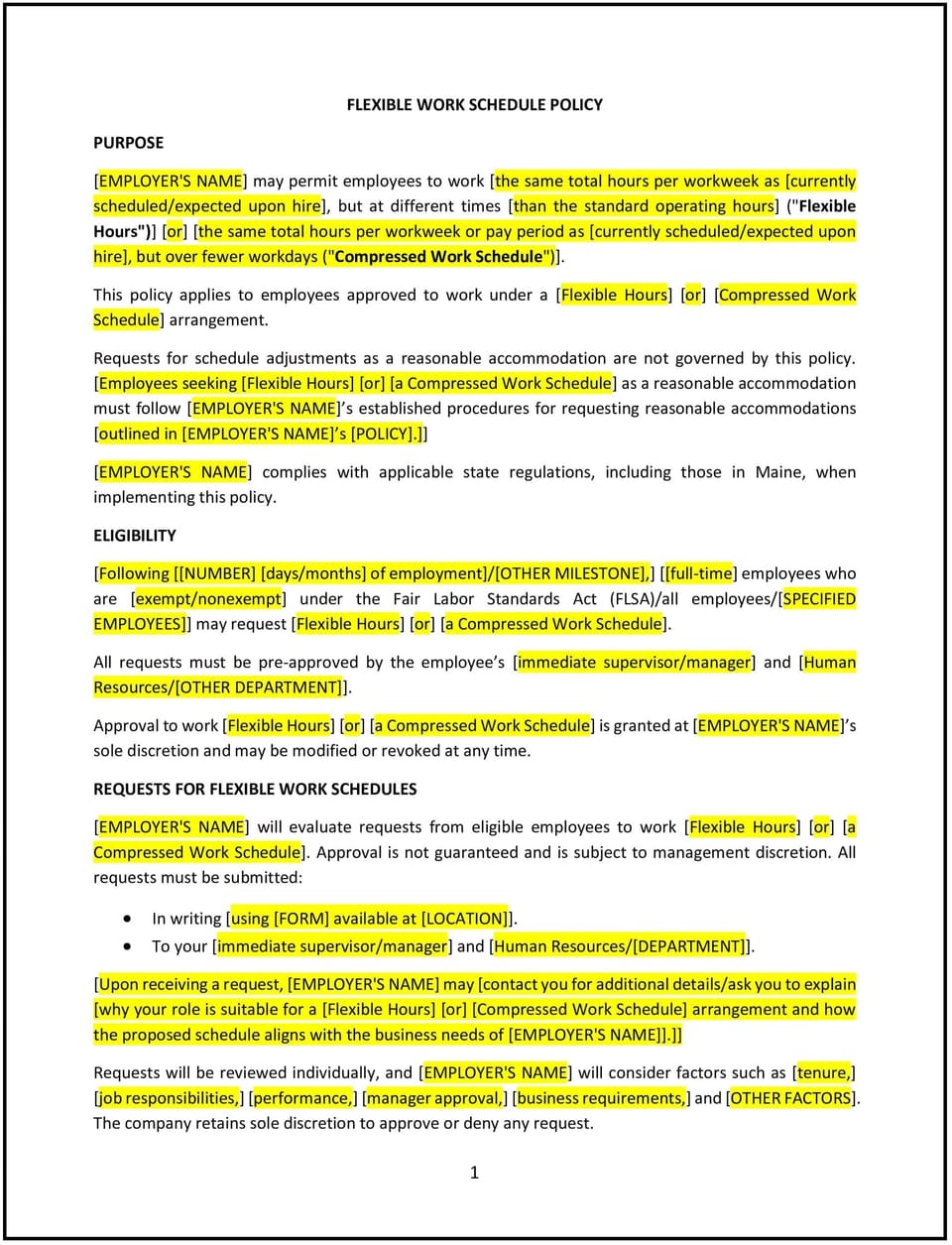Flexible work schedule policy (Maine): Free template

Flexible work schedule policy (Maine): Free template
This flexible work schedule policy is designed to help Maine businesses offer employees alternative work arrangements, such as adjusted hours, compressed workweeks, or remote work options. It outlines eligibility, request procedures, and expectations to balance employee needs with business operations.
By implementing this policy, Maine businesses can promote work-life balance, enhance productivity, and attract and retain top talent.
How to use this flexible work schedule policy (Maine)
- Define flexibility options: Specify the types of flexible schedules available, such as flexible start and end times, compressed workweeks, or remote work.
- Set eligibility criteria: Identify which roles or employees qualify for flexible schedules based on job responsibilities, performance, and operational requirements.
- Detail the request process: Provide steps for employees to request a flexible schedule, including required documentation and notice periods.
- Include evaluation criteria: Clarify how requests will be assessed, such as alignment with business needs and the employee’s ability to meet job expectations.
- Outline expectations: Include clear guidelines for maintaining productivity, meeting deadlines, and being available during core business hours if required.
- Address compliance: Ensure the policy adheres to Maine labor laws, including overtime regulations and wage requirements.
- Review regularly: Update the policy as necessary to reflect changes in workplace practices or Maine labor laws.
Benefits of using this flexible work schedule policy (Maine)
Implementing this policy provides several benefits for Maine businesses:
- Enhances work-life balance: Supports employees in managing personal and professional commitments.
- Increases retention: Attracts and retains top talent by offering desirable work arrangements.
- Boosts productivity: Improves focus and efficiency by allowing employees to work during their most productive hours.
- Reduces absenteeism: Minimizes unplanned absences by providing scheduling flexibility.
- Ensures consistency: Establishes a clear framework for approving and managing flexible schedules.
Tips for using this flexible work schedule policy (Maine)
- Communicate the policy: Share the policy with employees during onboarding and ensure it is easily accessible.
- Train managers: Provide training on evaluating requests fairly and maintaining operational effectiveness.
- Monitor performance: Regularly assess how flexible arrangements impact productivity and business goals.
- Use technology: Leverage tools for time tracking, collaboration, and communication to support flexible work arrangements.
- Address fairness: Ensure all employees have equal opportunities to request and benefit from flexible schedules.
- Stay compliant: Review Maine labor laws to ensure adherence to wage, hour, and overtime regulations.
Q: What types of flexible work schedules are covered under this policy?
A: Flexible schedules may include adjusted start and end times, compressed workweeks, part-time arrangements, and remote work options.
Q: How can businesses ensure productivity with flexible schedules?
A: Businesses can set clear expectations, track performance metrics, and maintain regular communication to ensure goals are met.
Q: How often should businesses review their flexible work schedule policy?
A: Businesses should review the policy annually or when changes to Maine labor laws or workplace needs occur.
Q: Are all employees eligible for flexible schedules?
A: Eligibility depends on the employee’s role, job responsibilities, and the business’s operational requirements, as outlined in the policy.
Q: How should employees request a flexible work schedule?
A: Employees should submit a formal request, including the proposed schedule and a rationale, for management’s review and approval.
Q: What steps should businesses take to manage remote work under this policy?
A: Businesses should provide remote work tools, set expectations for availability and communication, and regularly evaluate the arrangement’s effectiveness.
Q: How can businesses ensure fairness in granting flexible schedules?
A: Businesses should establish objective evaluation criteria and apply the policy consistently across all employees.
This article contains general legal information and does not contain legal advice. Cobrief is not a law firm or a substitute for an attorney or law firm. The law is complex and changes often. For legal advice, please ask a lawyer.


